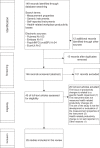Quality appraisal of generic self-reported instruments measuring health-related productivity changes: a systematic review
- PMID: 24495301
- PMCID: PMC3942271
- DOI: 10.1186/1471-2458-14-115
Quality appraisal of generic self-reported instruments measuring health-related productivity changes: a systematic review
Abstract
Background: Health impairments can result in disability and changed work productivity imposing considerable costs for the employee, employer and society as a whole. A large number of instruments exist to measure health-related productivity changes; however their methodological quality remains unclear. This systematic review critically appraised the measurement properties in generic self-reported instruments that measure health-related productivity changes to recommend appropriate instruments for use in occupational and economic health practice.
Methods: PubMed, PsycINFO, Econlit and Embase were systematically searched for studies whereof: (i) instruments measured health-related productivity changes; (ii) the aim was to evaluate instrument measurement properties; (iii) instruments were generic; (iv) ratings were self-reported; (v) full-texts were available. Next, methodological quality appraisal was based on COSMIN elements: (i) internal consistency; (ii) reliability; (iii) measurement error; (iv) content validity; (v) structural validity; (vi) hypotheses testing; (vii) cross-cultural validity; (viii) criterion validity; and (ix) responsiveness. Recommendations are based on evidence syntheses.
Results: This review included 25 articles assessing the reliability, validity and responsiveness of 15 different generic self-reported instruments measuring health-related productivity changes. Most studies evaluated criterion validity, none evaluated cross-cultural validity and information on measurement error is lacking. The Work Limitation Questionnaire (WLQ) was most frequently evaluated with moderate respectively strong positive evidence for content and structural validity and negative evidence for reliability, hypothesis testing and responsiveness. Less frequently evaluated, the Stanford Presenteeism Scale (SPS) showed strong positive evidence for internal consistency and structural validity, and moderate positive evidence for hypotheses testing and criterion validity. The Productivity and Disease Questionnaire (PRODISQ) yielded strong positive evidence for content validity, evidence for other properties is lacking. The other instruments resulted in mostly fair-to-poor quality ratings with limited evidence.
Conclusions: Decisions based on the content of the instrument, usage purpose, target country and population, and available evidence are recommended. Until high-quality studies are in place to accurately assess the measurement properties of the currently available instruments, the WLQ and, in a Dutch context, the PRODISQ are cautiously preferred based on its strong positive evidence for content validity. Based on its strong positive evidence for internal consistency and structural validity, the SPS is cautiously recommended.
References
-
- Drummond M, McGuire A, Economic Evaluation in Helath Care. Merging theory with practice. New York: Oxford University Press; 2001.
Publication types
MeSH terms
LinkOut - more resources
Full Text Sources
Other Literature Sources


